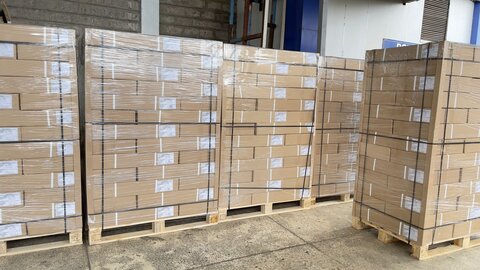Global Fund Procurement Boosts SMC Supply with 7 Million Doses of Life-Saving Antimalarial Treatment

In a significant win for malaria prevention, The Global Fund to Fight AIDS, Tuberculosis and Malaria for has procured 7 million doses of sulfadoxine-pyrimethamine plus amodiaquine (SPAQ), a key drug used in seasonal malaria chemoprevention (SMC), from Universal Corporation Limited (UCL), a Kenyan pharmaceutical manufacturer, in partnership with India-based Rena Experts Pvt Ltd.
With technical support from Medicines for Malaria Venture (MMV), UCL and Rena obtained WHO prequalification for SP, two of the drugs which form part of the combination used for SMC. This achievement highlights the importance of encouraging local drug manufacturing in Africa to improve regional supply security and contribute to the expansion of seasonal malaria chemoprevention (SMC) programmes.
In addition to bed nets and the new malaria vaccines, SMC has become a key intervention used to protect millions of children under five from malaria each year during the rainy season. This intervention was recommended by the WHO in 2012 to reduce the escalating burden of malaria cases and deaths in countries where the greatest burden and transmission of malaria is seasonal. Since 2012, 19 countries across Western, Central, Eastern and Southern Africa are now implementing SMC, reaching over 54 million children annually in 2024.
Amid global funding challenges, this procurement move by The Global Fund comes as a relief for the global malaria prevention community to curb an inevitable increase in malaria cases. Already, many endemic country governments and philanthropic donors are working to “save” the 2025 SMC campaigns, set to commence in less than one month across the Sahel. In Mali alone, an estimated 1.8 million children will receive four SPAQ doses each during the rainy season to prevent infection at the height of malaria transmission.
SMC has not only delivered life-saving health outcomes, but also significant economic benefits. It costs between $4 and $6.30 to protect a child with four courses of SMC per year, depending on local logistics. A 2021 study in seven countries found that SMC saved health systems approximately US$66 million and increased household productivity by US$43 million, reducing the need for costly treatments and hospital stays.
Given its immense economic impact and reach, a lapse in efforts, even for just one season, could result in a significant increase in malaria cases, hospitalisations and deaths among children, and great loss to economic productivity for caregivers in implementing countries.
With malaria cases threatening to rise due to funding gaps and emerging resistance to current interventions, this procurement is a timely boost. It reinforces the importance of local production, sustainable supply chains, and continued investment in proven, cost-effective tools like SMC.
Read the full story.